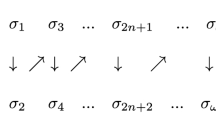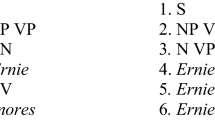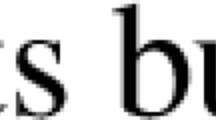Abstract
Several writers have assumed that when in “Outline of a Theory of Truth” I wrote that “the orthodox approach” – that is, Tarski’s account of the truth definition – admits descending chains, I was relying on a simple compactness theorem argument, and that non-standard models must result. However, I was actually relying on a paper on ‘pseudo-well-orderings’ by Harrison (Transactions of the American Mathematical Society, 131, 527–543 1968). The descending hierarchy of languages I define is a standard model. Yablo’s Paradox later emerged as a key to interpreting the result.
Similar content being viewed by others
References
Barrio, E., & Da Ré, B. (2017). Truth without standard models: some conceptual problems reloaded. Journal of Applied Non-Classical Logics. https://doi.org/10.1080/11663081.2017.1397326.
Cantini, A. (2004). Paradoxes, self-reference, and truth in the 20th century. In Gabbay, D.M., & Woods, J. (Eds.) Handbook of the history of logic (Vol. 5, pp. 875–1013). Elsevier .
Church, A. (1956). Review: John Myhill, a system which can define its own truth. Journal of Symbolic Logic, 21(3), 319.
Feferman, S., & Spector, C. (1962). Incompleteness along paths in progressions of theories. Journal of Symbolic Logic, 27(4), 383–390.
Halbach, V., Leitgeb, H., Welch, P. (2003). Possible-worlds semantics for modal notions conceived as predicates. Journal of Philosophical Logic, 32(2), 179–223.
Halbach, V. (2014). Axiomatic theories of truth. Cambridge University Press. Revised Edition. First Published in 2011.
Halbach, V. (2016). The root of evil: a self-referential play in one act. In van Eijck, J., Iemhoff, R., Joosten, J.J. (Eds.) Liber amicorum alberti: a tribute to albert visser, tributes (Vol. 30, pp. 155–163). London: College Publications.
Harrison, J. (1968). Recursive pseudo-well-orderings. Transactions of the American Mathematical Society, 131, 527–543.
Ketland, J. (2005). Yablo’s paradox and ω-inconsistency. Synthese, 145(3), 295–302.
Kripke, S.A. (1975). Outline of a theory of truth. Journal of Philosophy, 72(19), 690–716. Reprinted in Kripke (2011): 75–98.
Kripke, S.A. (1996). Elementary recursion theory and its applications to formal systems. Manuscript.
Kripke, S.A. (2011). Philosophical troubles collected papers Vol. I. New York: Oxford University Press.
Kripke, S.A. Three lectures on truth. To appear in: Logical troubles. Collected papers volume II. New York: Oxford University Press.
Martin, D.A. (2011). Field’s saving truth from paradox: some things it doesn’t do. Review of Symbolic Logic, 4(3), 339–347.
McCarthy, T. (1988). Ungroundedness in classical languages. Journal of Philosophical Logic, 17(1), 61–74.
Myhill, J. (1951). A system which can define its own truth. Fundamenta Mathematicae, 37, 190–192.
Spector, C. (1955). Recursive Well-Orderings. Journal of Symbolic Logic, 20(2), 151–163.
Tarski, A. (1935). Der Wahrheitsbegriff in die formalisierten Sprachen. Studia Philosophica, 1, 261–405. (modified from the original 1931 Polish version). English translation: “The Concept of Truth in Formalized Languages.” In Tarski, A. (1983). Logic, semantics, metamathematics: papers from 1923 to 1938. Clarendon Press. First Published in 1956, pp. 152–278.
Visser, A. (1989). Semantics and the liar paradox. In Gabbay, D., & Günthner, F. (Eds.) Handbook of philosophical logic, 2nd edn. (Vol. II, pp. 149–240). Springer.
Yablo, S. (1985). Truth and reflexion. Journal of Philosophical Logic, 14(3), 297–349.
Yablo, S. (1993). Paradox without self-reference. Analysis, 53(4), 251–252.
Acknowledgements
I would like to thank Eduardo Barrio and Romina Padró for their help in producing this paper. This paper has been completed with support from the Saul Kripke Center at the City University of New York, Graduate Center and a grant from the National Endowment for the Humanities (grant number RQ-255700).
Author information
Authors and Affiliations
Corresponding author
Rights and permissions
About this article
Cite this article
Kripke, S.A. Ungroundedness in Tarskian Languages. J Philos Logic 48, 603–609 (2019). https://doi.org/10.1007/s10992-018-9486-x
Received:
Accepted:
Published:
Issue Date:
DOI: https://doi.org/10.1007/s10992-018-9486-x




